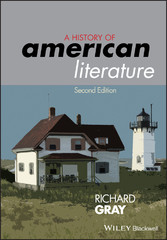
A History of American Literature

von: Richard Gray
Wiley-Blackwell, 2011
ISBN: 9781444345681
Sprache: Englisch
928 Seiten, Download: 1322 KB
Format: EPUB
Trends toward the secular and resistance
The power of Puritanism was, in fact, waning in New England well before the end of the eighteenth century. The number of “unchurched” colonists had been large to begin with, and they grew in number and power over the years. At the best of times for Puritanism, a high degree of political control had been made possible by restricting the suffrage to male church members. But that practice was soon modified, and then abolished in 1691 when it was replaced by a property qualification. Outside New England, the absence of one controlling cultural group was still more evident, since by 1775 half the population was of non-English origin. Scotch-Irish, Scottish, German, French Huguenot, and Dutch immigrants flooded the eastern seaboard; the Spanish settled a vast area over which they held dominion stretching from California to the Gulf Coast; and, by the end of the eighteenth century, more than 275,000 African slaves had been brought to America, mainly to the South. A rising standard of living encouraged Benjamin Franklin to claim, in 1751, that in the next century “the greatest Number of Englishmen will be on this side of the water.” It certainly helped to promote the growing secular tendencies of the age. Religion was still strong; and it was, in fact, made stronger by a sweeping revivalist movement known as the Great Awakening, in the third and fourth decades of the eighteenth century. “Under Great Terrors of Conscience,” as the preacher Jonathan Edwards put it, many thousands of people “had their natures overborn under strong convictions.” They were born again, in an experience of radical conversion; and they banded together in evangelical communities, convinced of the power of “Christ shedding blood for sinners” and the incalculable, more than rational nature of faith. The Great Awakening, however, was itself a reaction against what was rightly felt to be the dominant trend: the growing tendency among colonists to accept and practice the ideas of the Enlightenment, albeit usually in popularized form. Those ideas emphasized the determining influence of reason and common sense and the imperatives of self-help, personal and social progress. According to the philosophy of the Enlightenment, the universe was a rational, mechanical phenomenon which, as the English philosopher John Locke put it, ran rather like a self-winding watch. Once set in motion by its creator, God or an abstract First Cause, it no longer required His help or intervention. And man, using his reason and good sense, could ascertain the laws of this mechanism. He could then use those laws for his own profit, the betterment of society, and his own improvement since, as Franklin put it, “the one acceptable service to God is doing good to man.” It was an ethic with an obvious attraction for new generations of immigrants eager to stake their place and improve their lot in a new land with such abundant resources. And, even for those, the vast majority, who had never heard of the Enlightenment, the secular gospel of reason, common sense, use, profit, and progress became part of the American way.
The travel journals of two writers of this period, Sarah Kemble Knight (1666–1727) and William Byrd of Westover (1674–1744), suggest the increasingly secular tendencies of this period. Both Knight and Byrd wrote accounts of their journeys through parts of America that tend to concentrate on the social, the curious people and manners they encountered along the way. There is relatively little concern, of the kind shown in earlier European accounts of travels in the New World, with the abundance of nature, seen as either Eden or Wilderness. Nor is there any sense at all of being steered by providence: God may be mentioned in these journals, but rarely as a protective guide. Knight composed her journal as a description of a trip she took from Boston to New York and then back again in 1704–1705. It did not reach printed form until the next century, when it appeared as The Journals of Madam Knight (1825), but it was “published” in the way many manuscripts were at the time, by being circulated among friends. Her writings reveal a lively, humorous, gossipy woman alert to the comedy and occasional beauty of life in early America – and aware, too, of the slightly comic figure she herself sometimes cuts, “sitting Stedy,” as she puts it, “on my Nagg.” She describes in detail how she is kept awake at night in a local inn by the drunken arguments of “some of the Town tope-ers in [the] next Room.” She records, with a mixture of disbelief and amused disgust, meeting a family that is “the picture of poverty” living in a “little Hutt” that was “one of the wretchedest I ever saw.” “I Blest myself that I was not one of this miserable crew,” Knight remembers. Sometimes, Knight is struck by the beauty of the landscape she passes through. She recalls, for instance, how moved she was by the sight of the woods lit up by the moon – or, as she has it, by “Cynthia,” “the kind Conductress of the night.” Even here, however, the terms in which she expresses her excitement are a sign of her true allegiances. “The Tall and thick trees at a distance,” she explains, “when the moon glar’d through the branches, fill’d my Imagination with the pleasant delusion of a Sumpteous citty, fill’d with famous Buildings and churches, with their spiring steeples, Balconies, Galleries and I know not what.” Nature is most beautiful, evidently, when it evokes thoughts of culture; “the dolesome woods,” as she calls them elsewhere in her journal, are at their best when they excite memories of, or better still lead to, town.
The situation is more complicated with William Byrd of Westover. Born the heir of a large estate in Virginia, Byrd was educated in England and only made Virginia his permanent home in 1726. Byrd claimed, in one of his letters (published eventually in 1977 in The Correspondence of the Three William Byrds), that in America he lived “like … the patriarchs.” And, to the extent that this was possible in a new country, he certainly did. For he was one of the leading members of what eventually became known as the “first families of Virginia,” those people who formed the ruling class by the end of the eighteenth century – in the colony of Virginia and, arguably, elsewhere in the South. The “first families” claimed to be of noble English origin. Some of them no doubt were. But it is likely that the majority of them were, as one contemporary writer Robert Beverley II (1673–1722) put it in The History and Present State of Virginia (1722), “of low Circumstances … such as were willing to seek their Fortunes in a Foreign Country.” Whatever their origins, they had to work hard, since as one of them, William Fitzhugh (1651–1701), pointed out in a letter written in 1691, “without a constant care and diligent Eye, a well-made plantation will run to Ruin.” “’Tis no small satisfaction to me,” wrote another great landowner, Robert “King” Carter (1663–1732), in 1720, “to have a pennyworth for my penny”; and to this end he, and other Virginia gentlemen like him, were painstaking in the supervision of their landholdings. Nevertheless, they were keen to use their painstakingly acquired wealth to assume the manners and prerogatives of an aristocracy, among which was the appearance of a kind of aristocratic indolence – what one writer of the time, Hugh Jones (1670–1760), described in The Present State of Virginia (1724) as the gentleman’s “easy way of living.”
Byrd, of course, did not have to struggle to acquire wealth, he inherited it. Once he had done so, however, he worked hard to sustain that wealth and even acquire more. He personally supervised his properties, once he settled in Virginia, arranging for the planting of crops, orchards, and gardens; he also attended to his duties within his own community and in the county and the colony. And he was just as intent as his wealthy neighbors were on assuming the appearance of idle nobility. When writing back to friends in England, for instance, he tended to turn his life in Virginia into a version of the pastoral As his small hymns to Southern pastoral intimate, the desire to paint plantation life as a kind of idyll sprang from two, related things, for Byrd and others like him: a feeling of exile from the centers of cultural activity and a desire to distance the specters of provincialism and money-grubbing. Exiled from the “polite pleasures” of the mother country, in a place that he elsewhere described as the “great wilderness” of America, Byrd was prompted to describe his plantation home as a place of natural abundance, ripe simplicity, and indolence. Describing it in this way, he also separated himself from the work ethic that prevailed further north. A clear dividing line was being drawn between him and the life he and his social equals in Virginia led and, on the one hand, England, and on the other, New England. In the process, Byrd was dreaming and articulating what was surely to become the dominant image of the South.
That Byrd and the first families attempted to live according to this image there is no doubt. Both Byrd himself and Robert “King” Carter, for example, assumed the role and function of feudal patriarch on their plantations. Considering themselves the guardians of the physical and...








